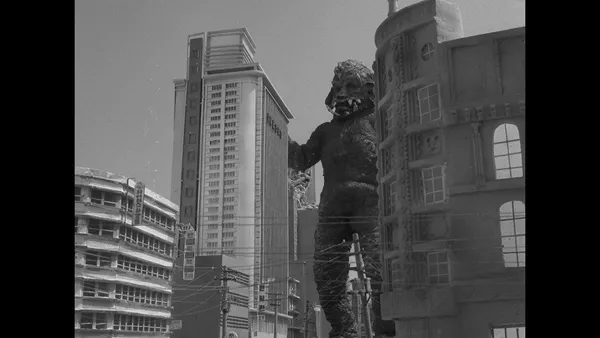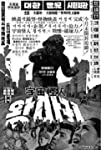Eye For Film >> Movies >> Space Monster Wangmagwi (1967) Film Review
Space Monster Wangmagwi
Reviewed by: Jennie Kermode

It’s 1967. Aliens are planning to invade the Earth, and reason that the many flat fields on the Korean peninsula, together with the cover offered by typhoons, make it an ideal landing spot. They don’t want to have to deal directly with human opposition, however, so they send down a space monster ahead of them. The process of dropping it from orbit makes it grow to 100 times its original size, and they reason that it will keep growing as it eats the planet’s native inhabitants – but Earth people may not be the easy targets they imagined.
There are similarities here to Plan 9 From Outer Space, not only in quality but in the use of curtains to guard against the interstellar vacuum; and to one of North Korea’s proudest cinematic achievements, Pulgasari, which features a similar-looking monster (but was made 18 years later so has rather less excuse). The creature, named Wang Mag-wi (literally ‘demon king’) is a man in a rubber suit where even the shape of the man has been poorly disguised, with only an ugly face and a couple of horns really distinguishing him, but everybody says he’s a monster, so there you go, and he is very large, so it makes sense that people would run away. To begin with he seems more curious than mean, even putting a bit of a building back after inspecting it, but he gradually gets the hang of the stomping business, and then, of course, he starts to destroy Seoul.
For some reason, filmmakers always believe that tales like this require a human element. In this case, there are three sets of recurring human characters. Two men provide comic relief with their macho posturing and a series of ill-advised bets (part of a long tradition of mocking gamblers). A loving couple having their wedding disrupted by the chaos – the groom being a soldier – and the bride makes a spectacular show of pouting about it, taking the alien invasion personally, until it actually does get personal when the monster kidnaps her for no obvious reason other than to leer at her cleavage. Meanwhile, an orphan boy enjoys a bit of good-natured looting before going on to challenge the monster with remarkable viciousness. The tolerance of modern viewers for these shenanigans is likely to vary, but overall they have more satisfactory kitsch appeal than their counterparts in most such fare.
From silver-painted cardboard alien spacesuits to the vague puffs of smoke which stand in for a death ray, there’s a good deal in this film that will endear it to genre fans with a fondness for the era. The disaster movie element, with crowds fleeing every which way in their attempts to escape, combines satirical jibes with literal toilet humour, presenting characters who are sufficiently varied that they feel much more human than those usually supplied elsewhere. There’s some nice model work, especially in the recreation of streets, and the editing does a good job of putting monster and people together even if we rarely see them in the same shot. A commendable effort has been made with the tools available for the job.
If you enjoy seeing big monsters stomp cities, this isn’t the most successful film of that ilk, but it’s a spirited effort which seems in retrospect to be an early signifier of the passion for genre cinema which would ultimately see South Korea become one of the world’s foremost filmmaking nations. It's enjoying a retrospective as part of the 2022 Fantasia international Film Festival. Catch it if you can.
Reviewed on: 15 Jul 2022

















